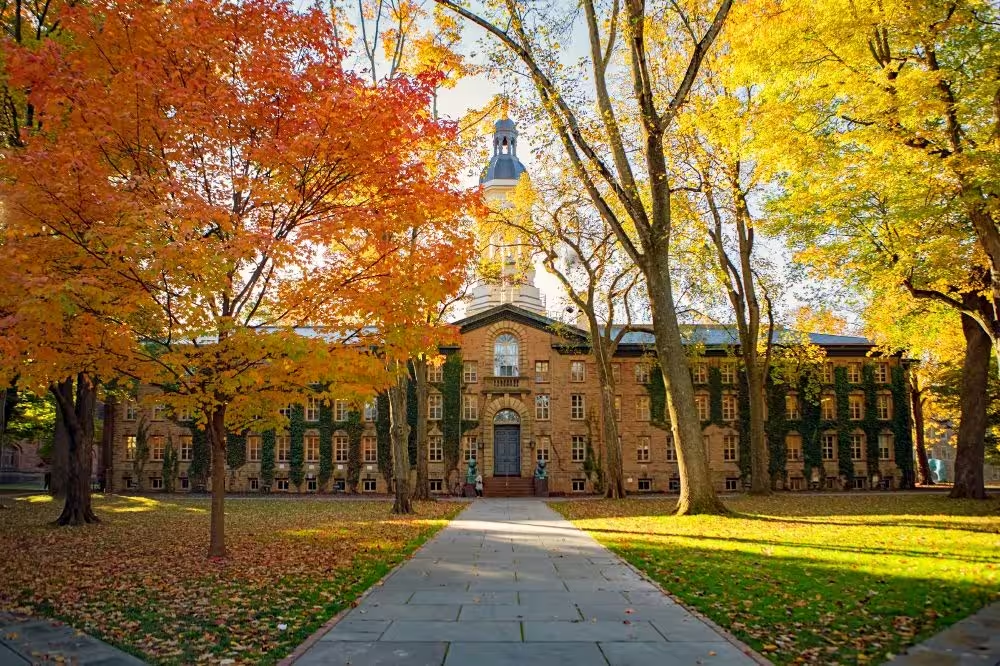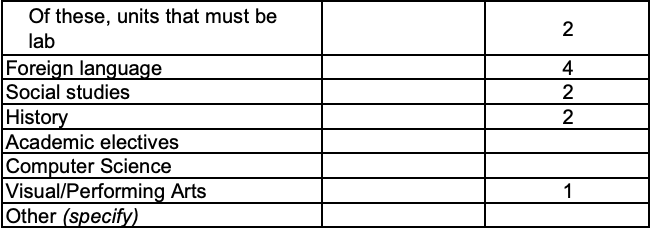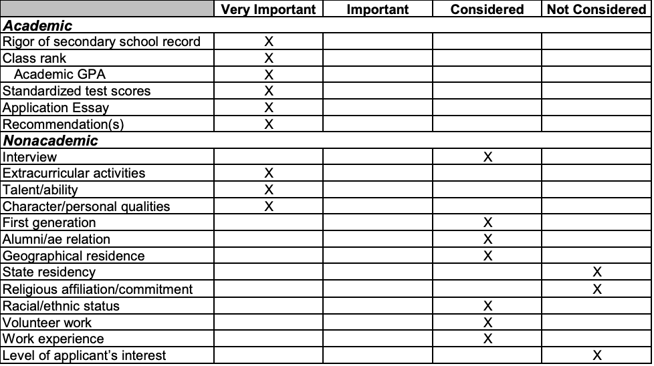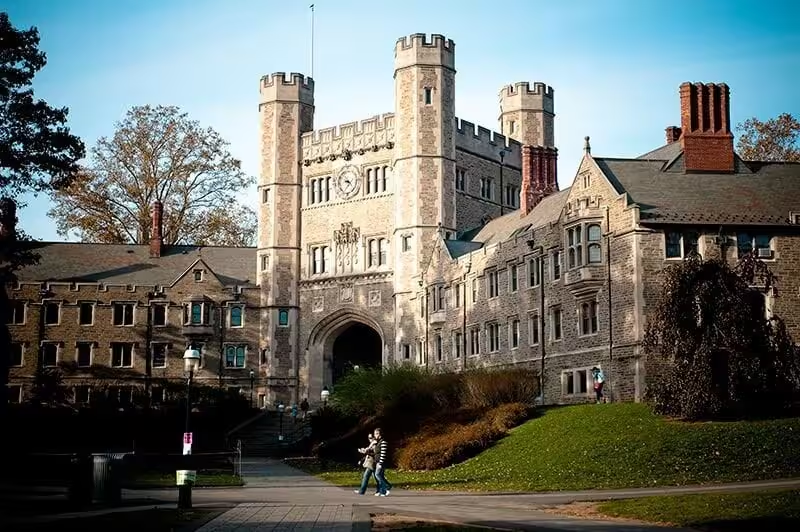Princeton University Admissions Profile

Introduction
Princeton University, known for its academic rigor and storied history, stands as a beacon of excellence in higher education. Aspiring students from around the world dream of securing admission to Princeton, and for good reason. In this comprehensive article, we delve into the Princeton University admissions profile, shedding light on the key factors that shape the application process, the qualities Princeton seeks in its applicants, and valuable insights for prospective students. So, if you're ready to embark on a journey of educational achievement, read on to discover the secrets behind Princeton University's admissions process.
Princeton University Admissions Profile
Princeton University, nestled in the idyllic town of Princeton, New Jersey, is renowned for its rigorous academic standards. The admissions profile provides a comprehensive overview of the qualities and achievements that Princeton looks for in its applicants. To gain a better understanding of what it takes to be admitted into Princeton, let's explore the various aspects of the Princeton University admissions profile.
Below are tables highlighting how Princeton evaluates each applicant through information published in the Common Data Set, a resource that compiles a standardized list of data items provided by universities about their admissions profiles.
Distribution of high school units required and/or recommended


Relative importance of each of the following academic and nonacademic factors in your first-time, first-year, degree-seeking general (not including programs with specific criteria) admissions

SAT and ACT Policies



Academic Excellence: The Foundation of Success
At Princeton, academic excellence serves as the cornerstone of the institution's mission. The admissions committee places a significant emphasis on an applicant's academic achievements. High school transcripts, including course selection, grades, and GPA, play a pivotal role in the evaluation process. Princeton seeks students who have demonstrated exceptional intellectual curiosity, a love for learning, and a track record of academic success.
Standardized Test Scores: Gauging Aptitude
Standardized tests, such as the SAT and ACT, provide an additional measure of an applicant's aptitude. While Princeton University takes a holistic approach to admissions, test scores hold weight in the evaluation process. Strong performance in standardized tests can enhance an applicant's candidacy and showcase their intellectual abilities.
Extracurricular Engagement: Demonstrating Passion and Leadership
Beyond academic achievements, Princeton values students who actively engage in extracurricular activities. Participation in clubs, sports, community service, research, and other pursuits demonstrates an applicant's multifaceted interests and their ability to make a positive impact. Princeton seeks individuals who have shown leadership skills, a commitment to their communities, and a genuine passion for their chosen endeavors.
Personal Statement: Unveiling the Applicant's Voice
The personal statement is a vital component of the Princeton application. This essay provides applicants with an opportunity to convey their unique stories, experiences, and aspirations. Princeton University places great importance on the personal statement, as it allows the admissions committee to gain insight into an applicant's character, values, and motivations. A well-crafted and authentic personal statement can make a significant difference in the admissions decision.
Supplemental Essays in Princeton University's Admissions Process
In addition to the Common Application or Coalition Application essay, Princeton University requires applicants to submit supplemental essays. These supplemental essays allow the admissions committee to gain a deeper understanding of each applicant, their academic interests, personal perspectives, and potential fit with the Princeton community.
For the 2023-2024 admissions cycle, Princeton requires one long essay and three short answer essays. Let's explore each of these in more detail:
Long Essay
The long essay should be about 650 words and must be written in response to one of the prompts provided by the university. The prompts generally focus on personal experiences, intellectual curiosity, social issues, and community engagement. The purpose of this essay is to gauge how the applicant thinks critically and expresses their thoughts coherently. The essay also provides an opportunity for the applicant to highlight their passion, dedication, and potential contributions to the university.
Short Answer Essays
The three short answer essays, each limited to 250 words, provide additional dimensions to the applicant's profile.
-
The first short answer question asks students to elaborate on an activity, organization, work experience, or hobby that has been particularly meaningful to them.
-
The second short answer prompt is focused on the applicant's major or academic interest. Here, the applicant is asked to detail why they are interested in the area of study they have chosen. This is an opportunity for students to demonstrate their intellectual curiosity and commitment to their chosen field.
-
The third short answer essay asks students how they would contribute to the Princeton community. This prompt is designed to gauge the applicant's potential impact on the university and showcases their understanding of Princeton's values and community.
Applicants should use these supplemental essays to display aspects of their personality, perspective, and passions that are not evident in other parts of their application. Each response should be well-thought-out, reflective, and genuine, and should ultimately present a comprehensive picture of the applicant's identity and potential.
Princeton University's supplemental essays are integral to the holistic review process. They help the admissions committee understand the person behind the application and see how they might contribute to the intellectual and social fabric of the university. Therefore, these essays should be crafted with care, reflecting the applicant's unique experiences, aspirations, and fit with Princeton University.
Sample Essays
Princeton's supplemental essay prompts vary from year to year. However, the examples below provide an excellent outline of what Princeton looks for in a star candidate.
Prompt: Briefly elaborate on an activity, organization, work experience, or hobby that has been particularly meaningful to you.
Answer:
I look up at the wall. This feels impossible.
“Just go for it!” my friend Jack says to me. “It seems harder than it is.”
During my first year climbing, I spent much time contemplating all possible routes and strategies. But gradually I’ve realized: because my perspective is limited as I stand on the ground, there’s only so much I can tell from looking ahead. Sometimes it is better to just go for it. Over the last couple of years this lesson has served me well: Had I known the difficult rhyme patterns I’d have to follow, I may not have written my play. Had I known the amount of reading ahead of me, I may not have started my research on Neo-Confucianism.
“Come on, [Student]!” Jack again.
I look up at the wall. Still feels impossible.
But I put a hand on it. Then a foot. Then pull up.
Prompt: At Princeton, we value diverse perspectives and the ability to have respectful dialogue about difficult issues. Share a time when you had a conversation with a person or a group of people about a difficult topic. What insight did you gain, and how would you incorporate that knowledge into your thinking in the future?
Answer:
When I joined the Huntsville Youth Commission, a group of students chosen to represent youth interests within local government, I met Jack. Jack told me his cousin’s body had been stuffed into the trunk of a car after he was killed by a gang. After that, my notion of normal would never be the same.
A melting pot of ideologies, skins, socio-economic classes, faiths, and educations, the DYC is a unique collaborative enterprise. Although I was initially intimidated after hearing stories like Jack’s, I soon realized that the members of the HYC never let difference become an obstacle to understanding. Even now, our experiences are like an elaborate network of roads: weaving, bumping, and diverging in unexpected ways. The Commission allowed us to bring our individual experiences into a shared space of empathy.
Jack talked about his cousin’s broken body. HYC supervisor Evelyn Scott explained that girls get ten-day school suspensions for simply stepping on another student’s sneakers. Witnessa educated us about “food deserts,” where people can’t count on their next meal. And I talked about being born in Tokyo, moving to London, and living in the south, finding a way to call each place home. How my family’s blending of Jewish tradition and Chinese culture—bagels and lox on weekends and dumplings every Lunar New Year—bridges distinct worlds.
My experience in this dynamic space of affirmation and engagement has made me a more thoughtful person and listener. Listening empathetically helped us envision multifaceted solutions to issues facing 21st-century youth. I want to continue this effort and be the woman, student, and friend who both expands perspectives and takes action after hearing people’s stories. Reconciling disparate lifestyles and backgrounds in the Commission has prepared me to become a compassionate leader, eager to both expand perspectives and take collaborative action.
Prompt: Princeton has a longstanding commitment to service and civic engagement. Tell us how your story intersects (or will intersect) with these ideals.
Answer:
The rusty spigot spewed a stream of Malibu High’s signature yellow water into my bottle. I raised it to see the visible particles floating around. “I’ll just wait another 5 innings for a drink,” I thought.
Malibu High’s water was universally shunned. The only alternative was bottled water, which wasn’t an option for those who couldn’t afford it, and which led to tens-of-thousands of plastic bottles in landfills annually.
Our environmental club set out with one goal: to provide everyone on campus with clean, filtered water.
With a hint of ignorance, we marched into the school board meeting and made our case for filtration stations. Unfortunately, the board was not as enthusiastic as us. Despite passionate speeches from myself and my environmentalist colleagues, they didn’t see the importance of our mission.
So we went rogue. Nearly every student and staff member joined our movement with a pen stroke, and our community united under a common vision for Malibu High’s future. Everyone wanted the water (it’s useful for survival), but the district still refused funding. In response, I set up a GoFundMe, and we rallied community support. The GoFundMe raised over $2,500. The district was out of excuses.
We got our water!
In only one semester with the stations, we have saved 30,000 plastic bottles. The stations have become the center of the Malibu campus and community: during passing period, students and staff get the rare opportunity to affiliate outside the classroom, all while enjoying a refreshing, non-yellow beverage.
Letters of Recommendation: Testimonies of Character
Letters of recommendation provide a perspective on an applicant's personal qualities and achievements from teachers, mentors, and supervisors. Princeton University requires two academic recommendations that shed light on an applicant's intellectual abilities, character, and potential for success. Choosing recommenders who can speak to an applicant's strengths and provide specific examples is crucial.
Demonstrated Interest: A Genuine Connection
While Princeton University does not explicitly track demonstrated interest, showcasing a genuine connection to the university can leave a positive impression on the admissions committee. Attending information sessions, visiting campus (when possible), and engaging with Princeton's resources and community can demonstrate a sincere interest in becoming part of the Princeton experience.
Princeton University Application Deadlines
Understanding Princeton University's application deadlines is crucial for all prospective students. There are two application rounds for Princeton: Single-Choice Early Action (SCEA) and Regular Decision (RD). Each has specific deadlines and notification dates, allowing applicants to choose a pathway that best suits their needs.
Single-Choice Early Action
Princeton's Single-Choice Early Action is designed for students who consider Princeton as one of their top choices. The SCEA deadline is November 1. Similar to Harvard's Restrictive Early Action, applicants applying SCEA to Princeton cannot apply early (either Early Decision or Early Action) to any other private college or university. However, they may apply to any public or international institutions.
SCEA applicants will receive their admission decisions in mid-December. Students admitted through SCEA have until May 1, the common reply date for college decisions, to accept or decline their offer. This allows students time to apply for financial aid, compare other college acceptances, and make an informed decision.
Regular Decision
Regular Decision at Princeton has a deadline of January 1. This option gives students more time to polish their applications, accumulate achievements, and make thoughtful college decisions. Princeton releases Regular Decision notifications in late March.
Like SCEA, admitted Regular Decision students also have until May 1 to accept or decline their offer, ensuring fairness and flexibility for all admitted students regardless of the application pathway chosen.
Financial Aid Application
For financial aid consideration, the application is due on February 1. Princeton University is committed to making its education affordable for all students and offers one of the most generous financial aid programs in the country.
Remember, Princeton's application deadlines are final, with applications needing to be submitted by 11:59 PM in the applicant's local time zone on the given dates. Late submissions are typically not accepted, so it's crucial for applicants to manage their time well and adhere to these deadlines.

Frequently Asked Questions
What is the acceptance rate at Princeton University?
Princeton University's acceptance rate is typically around 5-6%, making it one of the most competitive institutions to gain admission to.
Does Princeton University require interviews for all applicants?
Does legacy status play a role in admissions decisions at Princeton University?
Princeton University recognizes the legacy status of applicants (i.e., having a parent or grandparent who attended Princeton), but it is not a determining factor in the admissions process. All applicants are evaluated holistically based on their individual merits.
Conclusion
Securing admission to Princeton University requires a combination of academic excellence, intellectual curiosity, and a genuine passion for learning. By understanding the various components of the Princeton University admissions profile and showcasing your unique strengths, you can increase your chances of joining the esteemed Princeton community. So, dream big, work diligently, and let your aspirations guide you toward unlocking the doors to excellence at Princeton University.
